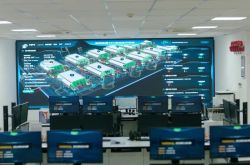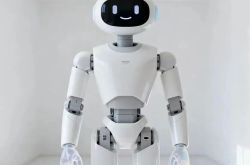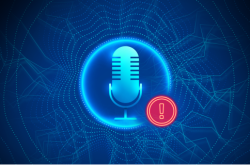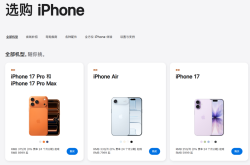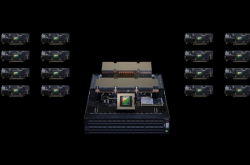AI PC is booming, and the next super trend is here!
![]() 10/09 2024
10/09 2024
![]() 637
637
At two important events held back-to-back in September, IFA (International Funkausstellung Berlin) and the Yunqi Conference, AI PCs emerged as a focal topic. For instance, Lenovo unveiled over ten AI PC models at IFA, pricing them as low as $800, and at the Yunqi Conference, they introduced a “full-stack AI” solution that includes AI PCs. According to the latest Canalys statistics, Lenovo's AI PC shipments increased by an astonishing 228% quarter-on-quarter. Driven by AI PCs, Lenovo achieved robust second-quarter results, with revenue reaching 111.9 billion yuan, a year-on-year increase of 20%.
Lenovo is not the only beneficiary of the AI PC boom. According to a Canalys report, global PC shipments reached 62.8 million units in the second quarter of 2024, up 3.4% year-on-year, marking the first rebound after years of decline. Notably, AI PC shipments accounted for 14% of total PC shipments during the quarter, at 8.8 million units.
AI PCs have emerged as a phenomenal growth point for the PC and broader hardware industry. Why did PCs, rather than smartphones or other devices, pioneer the AI dividend? And what does AI bring and change for businesses with respect to PCs? To answer these questions, we must delve into the history and current state of AI PCs.
The Past of AI PCs: From Deep Learning to Large Models in “AI+PC”
AI technology has been around for years. In 2016, with AlphaGo's victory over Lee Sedol in the Go match, deep learning technology experienced a surge. However, mobile devices were initially seen as the ideal platform for AI, including smart speakers, smartphones, and smart homes equipped with voice assistants, as well as short video and information flow apps offering personalized content recommendations. PCs were not left out; “AI+PC” integrations had already begun. In 2014, Microsoft launched Cortana and integrated it into Windows, while Apple renamed OS X to macOS and introduced Siri for the first time in 2016. PC internet giants like Baidu, 360, Google, and Sogou also introduced AI applications like image search.
At the end of 2022, ChatGPT debuted, triggering an explosion in large model technology. The core value of AI shifted from deep learning's “perception and interaction” to large models' “cognition and decision-making,” enabling machines to perform numerous tasks like creation, statistics, and office work. This shift also made PCs the primary vehicle for AI. At the beginning of the year, Zhou Hongyi, founder and chairman of 360 Group, pointed out this trend:
“As a new productivity force, AI is more convenient to implement and use on PCs. In some emerging AI application scenarios abroad, the first versions of products are also based on PCs, presenting an opportunity for the domestic PC industry.”
Zhou Hongyi's prediction has been validated by the market. According to SimilarWeb data, in May, 47% of global AI industry traffic came from PC screens, an 8% month-on-month increase, making PCs the primary platform for large model implementations. Users leverage generative AI software on PCs for entertainment content like videos and images but primarily for work and learning, such as creation, design, programming, search, and data processing.
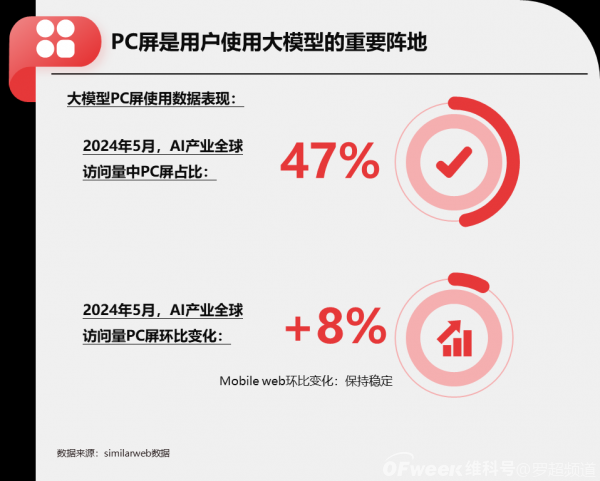
As a result, leading AI large model software developers prioritize PCs as their core channel for promotion. During the Yunqi Conference, I spoke with the head of a major AI large model company, Kimi's developers from Dark Side of the Moon, who emphasized that Kimi has “the largest user base on the PC platform in the industry.” Coincidentally, ByteDance's Doubao recently launched a PC version… Everyone is strengthening their PC-side presence and promoting it as a core channel.
This trend is also corroborated by 360's data. From January to July 2024, the number and spending of 360's AI business clients in the business services industry increased significantly, with a year-on-year increase of 341% in Q2 compared to 2023. PC search accounts for over 98% of AI business client placements.
Yu Shijun, General Manager of 360 Business Industry Department III, noted that amidst the rapid growth of AI users on PCs, besides traditional search and display ads, leveraging 360 Software Manager can facilitate one-click software activation and downloads, significantly shortening the conversion funnel. Additionally, products like 360 AI Selection Platform and 360 AI Premier Membership, while bridging AI application developers and users, also preemptively occupy scene layouts for AI tool product marketing and promotion.
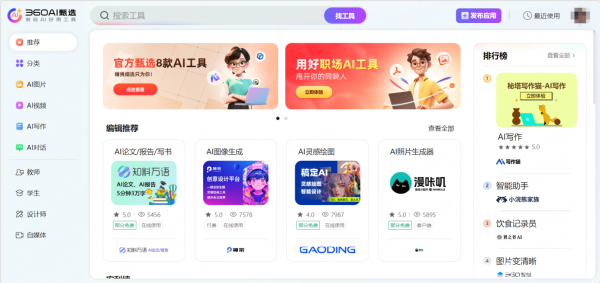
The integration of “AI+PC” is accelerating, but as AI demand on PCs intensifies, “AI+PC” alone may struggle to fundamentally meet the needs of enterprises and individuals for large model applications.
On the one hand, AI applications on PCs, whether web-based or client software, remain scarce. A survey by Miaozhen Systems revealed that nearly 80% of users anticipate AI functionalities being integrated into PCs.
On the other hand, traditional PCs are struggling to keep up with the explosive demand for AI. Earlier this year, Zhou Hongyi predicted in his outlook on AI large model trends in 2024 that, “While making large models ‘bigger,’ making them ‘smaller’ is also an important trend, enabling large models to be deployed on mobile phones, computers, and various IoT devices.” From an enterprise information security and privacy protection perspective, privatizing large models offers greater advantages when applied on PCs. As users increasingly prefer processing more data on the client-side, PC computing power becomes increasingly inadequate for deploying large models on the client-side.
Thus, AI PCs emerged on the scene, building upon the foundation of “AI+PC.”
The Application Ecosystem is Growing, and Brands Are Leading the Way with Marketing
There is no standard definition for AI PCs. In terms of computing power, Microsoft has set requirements for AI PCs: the core standard for Windows 11 AI PCs is that the NPU possesses at least 40TOPS of AI computing power. Aligning with this benchmark, chip giants like Intel, Qualcomm, AMD, and NVIDIA, as well as hardware titans like Lenovo, Dell, HP, ASUS, Huawei, Xiaomi, and Honor, have converged to promote the popularity of AI PCs. In March this year, Apple also entered the AI PC arena with the introduction of its self-proclaimed “best AI consumer laptop,” the MacBook Air (M3 version). At the recent IFA, Qualcomm further lowered the hardware threshold for AI PCs with the launch of its latest Qualcomm Snapdragon X Plus (8-core) mobile platform.
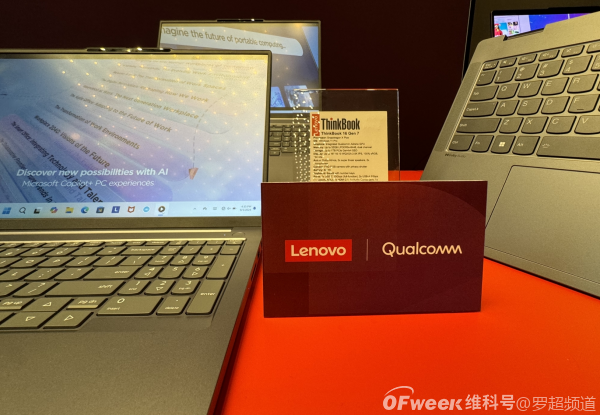
(Lenovo's AI PC products unveiled during IFA, source: Lei Technology)
However, AI PCs are not merely “high-performance PCs.” What truly sets AI PCs apart from traditional PCs in terms of experience and value is their application ecosystem. Just as iPhones or Android phones are smartphones, it's the millions of apps developed by developers that constitute the mobile internet. Similarly, without a thriving application ecosystem, AI PCs would be like a tower built on sand or water without a source.
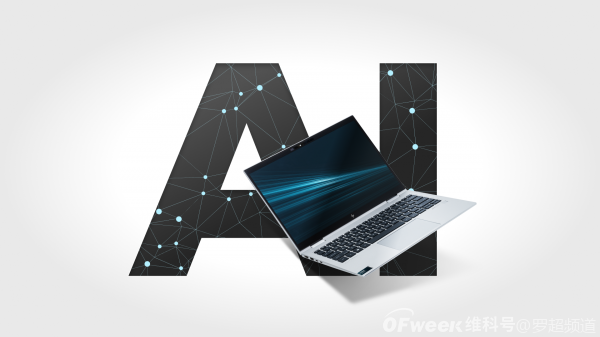
Software giants are already taking action to build AI PC application ecosystems. Microsoft aims to disrupt users' experience with operating systems and office software like Office through Copilot, upgrading its mission from “a PC on every desk and in every home” to “a Copilot for everyone.” Similarly, leading office software giants like Adobe, WPS, DingTalk, and others are all-in on AI.
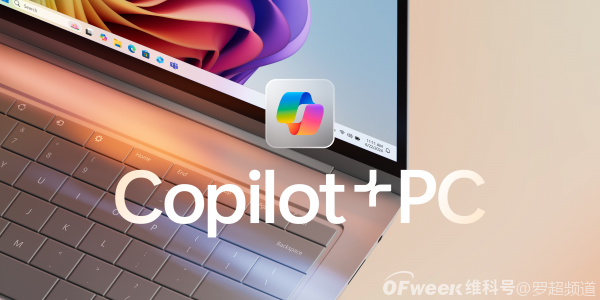
Internet giants are also actively contributing to the AI PC application ecosystem.
For instance, “AI Search” has gained increasing popularity among users due to its novel interaction logic and product value. Players like Google, Baidu, 360, Tiangong, Mita, WeChat, iFLYTEK Spark, and more are intensifying their investments in AI search. According to data from the “AI Product Rankings,” in August 2024, 360 AI Search retained its position as the world's most visited AI-native search engine, with over 200 million visits from 360 AI Search users, according to SimilarWeb data.
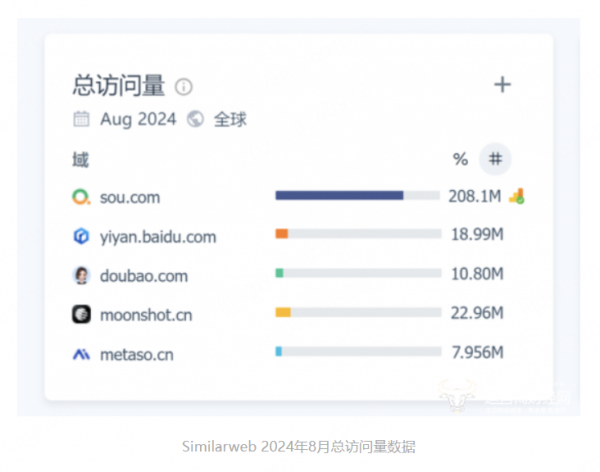
Another example is how AI is transforming browsers from mere “web browsing tools” into “intelligent assistant engines.” Browsers embedded with AI large models and assistants can cater to users' personalized service needs in professional scenarios.
It's worth noting that most AI applications spawned by AI PCs are “downwardly compatible,” meaning they are adaptable to traditional PCs, especially cloud-based AI applications like AI search, AI browsers, AI office tools, and AIGC creation, which can all run on traditional PCs. Given that it may take several years for AI PC penetration to exceed 50%, it's foreseeable that AI PCs will coexist and develop alongside “AI+(traditional) PCs” for an extended period, with a joint outcome of an explosion in the AI application ecosystem on the PC side.
For enterprises, whether it's “AI+(traditional) PCs” or AI PCs, the current biggest opportunity lies in brand marketing.
First, AI is driving a rebound in the PC market, leading to more PCs, users, time spent, and traffic.
PC traffic is becoming a new value proposition. The emergence of AI is once again making the PC landscape lush and fertile. Canalys predicts that PC shipments will grow by 8% in 2024, with the primary growth driver being AI PCs, which are projected to account for 60% of all PC shipments by 2027. PCs are becoming one of the few media formats with incremental growth, making it an opportune time for brands to revisit or reinvest in PC marketing.
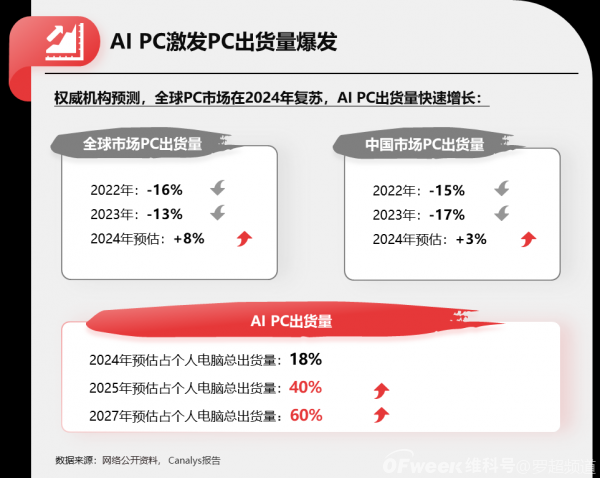
Second, PCs offer unique marketing value that complements mobile, offline, and TV devices.
1. PCs have strong reach among specific demographics, including high PC users like young and middle-aged adults, those in first-tier cities, highly educated individuals, and those with high incomes and spending power. Another group is AI application “pioneers” like IT professionals, college students, white-collar workers, designers, and new media practitioners. Brands looking to target these groups should prioritize PC scenarios.
2. PCs have a profound influence on decision-making. Consumers often make rational, long-term decisions on PCs, such as purchasing digital products, homes, cars, insurance, training courses, and long-distance travel. For these rational, long-term decisions, PCs offer an irreplaceable level of influence.
3. PCs have a stronger presence and visibility. Simply put, ads can be larger, display longer or more frequently on PC screens, making them more effective than mobile devices in disseminating and infiltrating marketing content. Unlike outdoor, elevator, or TV screens, PC screens offer interactive capabilities.
Third, the explosion of AI applications is uniquely poised to elevate PC marketing.
AI large models are reshaping all aspects of marketing. In practice, PCs will be a crucial battleground for AI marketing. With AI technology, both “AI+PCs” and AI PCs endow PCs with unique AI marketing capabilities in user insights, personalized marketing (tailored to each individual), and interactive experiences.
For instance, 360 Smart Business's “AI Product Direct” ads redefine common brand direct ads in the search industry by leveraging large model technology and AIGC digital humans. When users search for related brand or product terms, they can engage in multi-round interactions with digital humans, ultimately facilitating conversions after multiple rounds of guided question-and-answer sessions. It's foreseeable that on AI PCs and other AI-upgraded devices, this type of AI marketing will become more prevalent.
In the future, all smart devices like phones, tablets, TVs, and cars will evolve into AI devices. As AI becomes ubiquitous, brands must be prepared. Mastering PC marketing in the AI era is the first and crucial step.
The Future of AI PCs: AI PCs+, the Next Super Trend?
The prosperity of the AI application ecosystem is not the end of AI PC development. More important than hardware is the software ecosystem, and even more critical is the industry behind it.
Using the development of the internet as an analogy, from “+internet” to “internet+,” the deepening application of internet technology has given rise to new services, models, and formats, driving a golden decade of industry and economic growth. Following this logic, AI PCs will also evolve from the “AI application ecosystem” to penetrate various industries, forming a new wave of “AI PCs+.” By integrating massive intelligent agents, AI PCs will revolutionize business models and users' lifestyles, work, and learning methods.
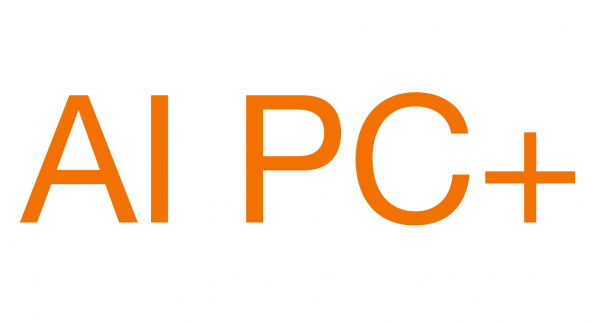
As “AI PCs+” reshape service processes and experiences across industries, businesses will undergo transformative changes, including in product forms, business models, and service formats. Brand marketing will also face new challenges and opportunities, such as how to seamlessly integrate “guided conversions” into interactions between intelligent agents and users. If everyone has an AI personal assistant in the future, brands must ponder whether to forge relationships with users or AIs.
Furthermore, in the “AI PCs+” stage, AI PCs will integrate more deeply with various hardware. Today, all manufacturers, including Apple, Huawei, Samsung, Lenovo, Xiaomi, and others, emphasize multi-screen collaboration to enable data flow, application synchronization, and content sharing, providing users with a seamless experience across scenarios. For instance, Xiaomi promotes the “human-vehicle-home ecosystem,” while Microsoft, Apple, and Huawei are “overhauling” their operating systems to embrace the multi-screen interaction trend in the AI era.
In multi-screen collaboration scenarios, AI PCs serve as both an indispensable hub and a new value anchor. On the marketing front, they can deeply integrate with mobile phones, tablets, cars, and even home appliances. By leveraging data, scenarios, and content integration, AI PCs can cover users across scenarios, deepen memory, and efficiently convey brand messages.
In summary, brands can leverage the unique value and differentiated positioning of PCs in the AI era to overcome the challenge of online traffic depletion and secure a ticket to the era of AI marketing and AI PCs+. Some forward-thinking internet marketing platforms have already introduced AI marketing solutions. For instance, 360 Smart Marketing Cloud's AI product matrix can help enterprises enhance service efficiency and quality, with applications in education, government affairs, exhibitions, and other industries.
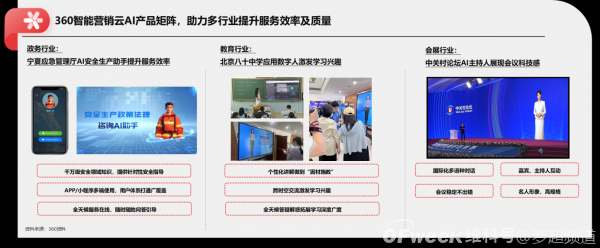
Written at the end:
I believe that AI PC is of great significance, and PC itself has been redefined: it is no longer a personal computer, but personal computing. As early as 2009, then-Intel CEO Otellini proposed that the world was evolving from the Personal Computer Era to the Personal Computing Era, a concept that was very advanced at the time.
Nowadays, the emergence of AI PC represents the ultimate form of "personal computing": by redefining hardware and software based on AI, PC will become a device filled with agents, truly user-centric in handling various tasks: as a productivity tool, it continuously improves work and creation efficiency; as an entertainment and lifestyle computing device, it continuously enhances user experience. AI PC will serve as a portable computing "magic box" for everyone, serving as their most loyal personal assistant in all aspects of work and life. When AI PC serves each individual well, it naturally extends into industries and becomes a natural fit for business applications.


